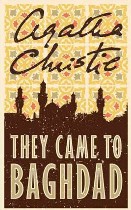 Agatha Christie •
Agatha Christie •
They Came to Baghdad •
Most fictional detectives don’t have to worry about paying the rent; they’re either comfortably off or very well-heeled indeed.
Christie, however, likes underdogs. Her central characters are often jobless and penniless, scrounging for the price of a cup of tea and a bun. In real life this is no fun, but in books it gives them several advantages: They readily enlist the reader’s sympathy; they’re more inclined to take risks, as they have nothing to lose; and they get plenty of opportunities to live by their wits.
Victoria Jones is a classic case. She gets sacked for imitating the boss (the sympathy factor) and takes up with a young man she meets in the park (risk), bluffing her passage to the Middle East to be near him (wits). There she impersonates a research assistant at an archaeology dig while finding herself drawn into an international plot.
Leave it to Agatha Christie to invent a gang of sulky, squabbling criminals who call their organization the Olive Branch. And the nickname one character uses for Dr. Pauncefoot Jones had me laughing for days.
As a kid I turned up my nose at Christie’s writing, believing that any author so prolific couldn’t possibly be good. I’m happy to say I was wrong.








Your email address will not be published.